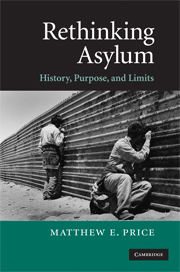Book contents
- Frontmatter
- Contents
- Acknowledgments
- Introduction
- Chapter 1 Recovering Asylum's Political Roots
- Chapter 2 Promoting Political Values through Asylum
- Chapter 3 What is “Persecution”?
- Chapter 4 Persecution by Private Parties
- Chapter 5 Asylum, Temporary Protection, and the Refugee Policy Toolkit
- Chapter 6 Restrictions on Access to Asylum
- Conclusion
- Bibliography
- Index
Chapter 4 - Persecution by Private Parties
Published online by Cambridge University Press: 26 January 2010
- Frontmatter
- Contents
- Acknowledgments
- Introduction
- Chapter 1 Recovering Asylum's Political Roots
- Chapter 2 Promoting Political Values through Asylum
- Chapter 3 What is “Persecution”?
- Chapter 4 Persecution by Private Parties
- Chapter 5 Asylum, Temporary Protection, and the Refugee Policy Toolkit
- Chapter 6 Restrictions on Access to Asylum
- Conclusion
- Bibliography
- Index
Summary
Traditionally, forced migration has been caused by state-sponsored violence, and until now, I have exclusively considered “persecution” carried out by agents of the state. But increasingly, refugees seek protection from violence perpetrated by non-state agents, such as death squads, criminal gangs, rebel armies, and clans. How ought asylum law respond to this reality? Under what circumstances should asylum be extended to those fleeing harm inflicted by non-state agents?
At the outset, one can distinguish between two types of situations. In the first, the state is unable, owing to limited resources, poor organization, or weak institutions, to provide effective protection against violence inflicted by non-state agents. In the second, the state tacitly condones or is complicit in such violence and is therefore unwilling to provide protection against it. I conclude that asylum law should treat these two scenarios differently. In the first, I argue, asylum is not an appropriate response; instead, those fleeing violence carried out by non-state agents should be able to receive temporary protection while their states build the capacity necessary to offer effective protection. In the second, by contrast, asylum is entirely fitting: a state can and should be held to account for violence by non-state agents that it condones, tolerates, or encourages.
That conclusion is controversial. Increasingly, courts in Europe, North America, Australia, and New Zealand decline to distinguish between an inability to protect and an unwillingness to do so.
- Type
- Chapter
- Information
- Rethinking AsylumHistory, Purpose, and Limits, pp. 146 - 163Publisher: Cambridge University PressPrint publication year: 2009



